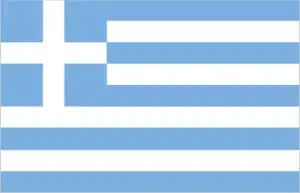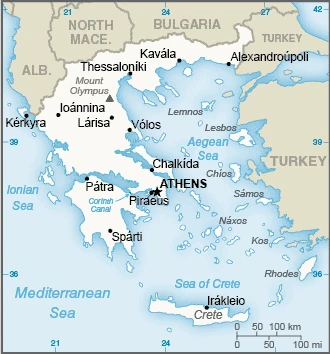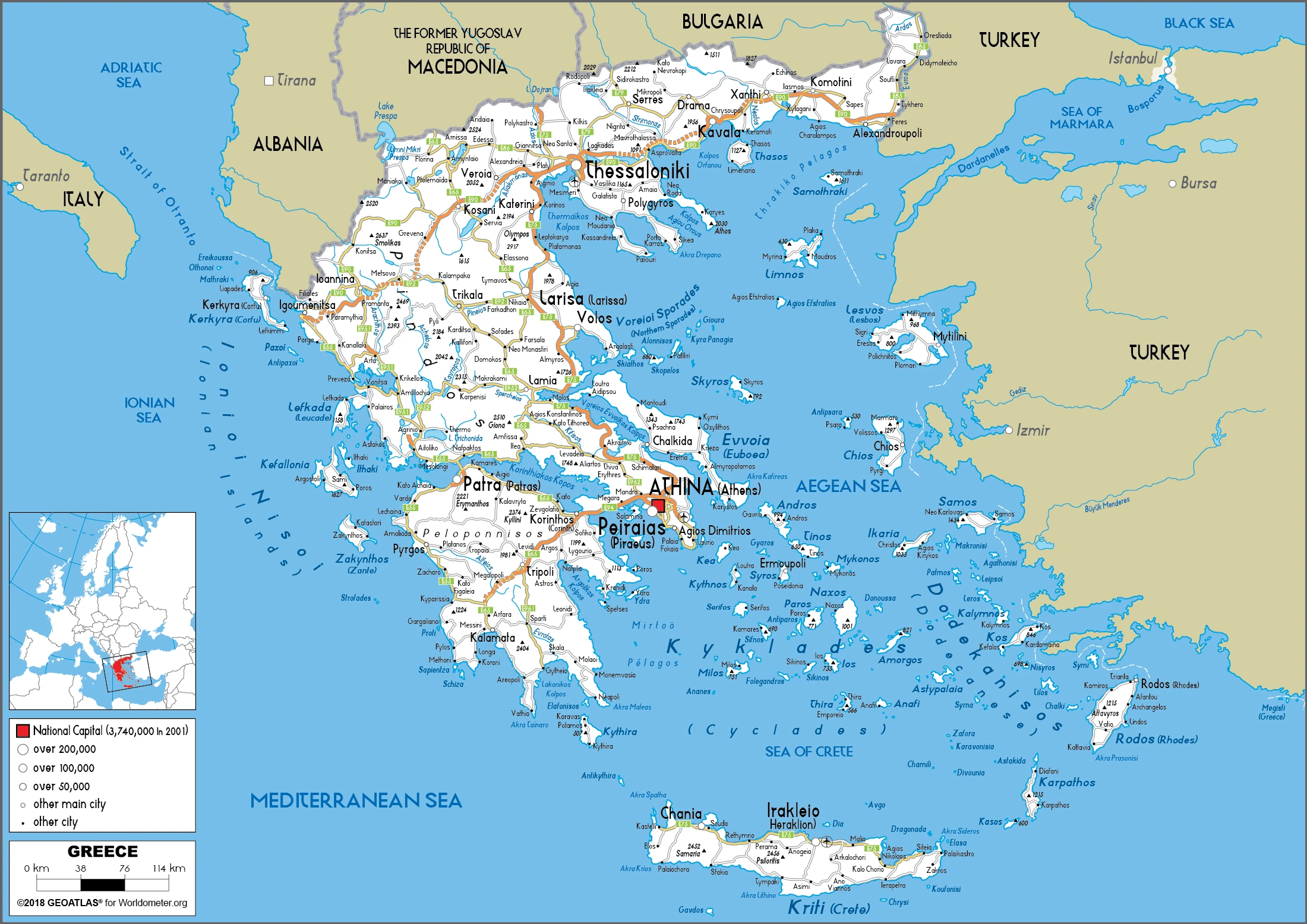Greece Google Maps is a site/tool that offers a wide range of map views (topographic, satellite, street view) and navigation options, with little effort on your part, yet efficiently. If you need to plan a trip to a new place like Greece, Google maps are available on desktop, mobile, or tablet. This Google maps and information page is dedicated to Greece, Europe (47 countries), showing its location, country facts, details about its capital city Athens, bordering countries like Albania, Bulgaria, Macedonia, Turkey, and plenty of other information which may be interesting when you visit this European state.
Quick links: Google Maps Greece, Athens Google maps, Driving Directions Greece, Printable Road Map.

About Greece in a nutshell
- Conventional short form of the name: Greece
- The conventional long form of the name: Hellenic Republic
- Local long form: Elliniki Dimokratia
- Local short form: Ellas or Ellada
- Former name(s): Hellenic State, Kingdom of Greece
- Etymology: the English name derives from the Roman (Latin) designation Graecia, meaning Land of the Greeks; the Greeks call their country Hellas or Ellada.
- The legal system in Greece: a civil legal system based on Roman law.
- Climate: Mainly Mediterranean, with dry, hot summers. Alpine in northern mountain areas. PEOPLE & SOCIETY
- The national symbols are the Greek cross (white cross on a blue field, arms of equal length), while the national colors: are blue and white.
- Internet TLD: .gr
The 2004 Summer Olympics brought many visitors to Athens, leaving lasting changes throughout Greece. Visitors can experience excellent roads, swifter public transportation systems, and pedestrianized walkways in Athens throughout the country. There is a new shift from conventional hotels towards upscale boutique hotels with amenities such as spas. The “glory that was Greece” still attracts visitors here. Greece offers sites such as Olympia – where the games began, Delphi – with the magnificent temple of Apollo, Mycenae – where Agamemnon met his bloody death when he returned home from Troy, and Epidaurus – which has a well-preserved ancient theater, along with many other lesser-known ancient sites such as Nemaea – home to an exceedingly carefully restored stadium. One thing that has made Greece so famous is the myths and monuments they have, but it is not the only thing that makes Greece a fascinating country. Among many other exciting features of Greece, it is also an ideal vacation spot with beautiful beaches and towering mountains.
This is a modern country, with prices to reflect that. The days of cheap vacations in Greece are over, but the combination of new and old is still priceless. In any location, you can experience philoxenia, even hospitability for strangers.
The Hellenic mountain range stretches across the Peloponnese peninsula in a series of parallel chains, then sinks into the depths and reappears on the island of Crete. The crystalline ridges of the Thes Salar-Reef region are joined to the south by the Cyclades archipelago. Along the faults, volcanoes have risen from the sea in places.
World heritage sites from one of the earliest civilizations in the Mediterranean also represent the most critical periods of Greek history and culture from the 3rd millennium BC to the present day. In addition to Vergma, the ruins of the first Macedonian capital Aigai, the ruins of the ancient civilizations of Mycenae and Tirun, the sanctuary of Hera of Samos and the remains of the city of Puthagoreon, the sanctuary of Zeus at Olympia, the sanctuary of Apollo at Delphoi, the temple of Apollo Epucurus at Bassa, the Acropolis at Athens, the theatre of Epidaurus and the early Christian and Byzantine monuments of Thessaloniki. The Byzantine fortress of Mistra, Daphni. The monasteries of Hosius, Lucas, and Nea Moni. The monastery of St John of Patmos, the medieval fortress of Rhodes, and the old town of Corfu. The orthodox spiritual center of Mount Athos has been inhabited by monks since the 11th century, as has the monastery of Meteora, built on the cliffs.
The modern Olympics, first held in Athens in 1896, evolved from Olympias ancient Greek games.
Background
Greece achieved independence from the Ottoman Empire in 1830. The Government’s second half of the 19th century and the first half of the 20th century gradually added neighboring islands and territories, most with Greek-speaking populations. In World War II, Italy first invaded Greece (1940) and was subsequently occupied by Germany (1941-1944). Fighting endured in a protracted civil war between supporters of the king and other anti-communist and communist rebels. Following the latter’s defeat in 1949, Greece joined NATO in 1952. In 1967, military officers seized power, establishing a military dictatorship that suspended many political liberties and forced the king to flee the country. In 1974 following the collapse of the dictatorship, democratic elections and a referendum created a parliamentary republic and abolished the monarchy.
In 1981, Greece joined the EC (now the EU). It became the 12th member of the European Economic and Monetary Union (EMU) in 2001. Greece has suffered a severe economic crisis since late 2009 due to nearly a decade of chronic overspending and structural rigidities. In 2010, Greece entered three bailout agreements – with the European Commission, the European Central Bank (ECB), the IMF, and the third in 2015 with the European Stability Mechanism (ESM) – worth about $300 billion. The Greek Government formally exited the third bailout in August 2018.
Geography
Mountainous peninsula and over 2000 islands. Large plain along the mainlands Aegean coast.

The Balkan state of Greece is bounded on three sides by the Mediterranean, Aegean, and Ionian seas. It has a strong maritime tradition, with some of the worlds wealthiest shipowners.
This state is located in Southern Europe, bordering the Aegean Sea, Ionian Sea, and the Mediterranean Sea, between Albania and Turkey, under the coordinates of 39 00 N, 22 00 E, covering an area of 131,957 sq km with a coastline of 13,676 km. Greece is Slightly smaller than Alabama.
Greece has 1,110 km of land boundaries in total and borders (4 nations): Albania 212 km, Bulgaria 472 km, Macedonia 234 km, Turkey 192 km.
Mountainous ranges extend into the sea as peninsulas or chains of islands, with Mount Olympus at 2,917 as the highest point of Greece, while the Mediterranean Sea at 0 m as the lowest point, causing a mean elevation of 498 m throughout the country. With 131,957 sq km, Greece has 130,647 sq km of land and 1,310 sq km of water surface area.
Strategic location dominating the Aegean Sea and southern approach to Turkish Straits, a peninsular country possessing an archipelago of about 2,000 islands.
The climate in Greece is as follows: Temperate, mild, wet winters, hot, dry summers.
When you visit Greece, the natural hazards shall be considered: Severe earthquakes and volcanism: Santorini (367 m) has been deemed a decade volcano by the international association of volcanology and chemistry of the interior of the earth, worthy of study due to its tumultuous history and proximity to human populations. However, there have been very few eruptions in recent centuries. Methana and Nisyros in the Aegean are classified as historically active.
The following major health-threatening issues shall be considered when visiting Greece: none.
Current environmental issues affecting the Greek people: air pollution; air emissions from transport and electric power stations; water pollution; degradation of coastal zones; loss of biodiversity in terrestrial and marine ecosystems; increasing municipal and industrial waste.
Google Maps Greece
The capital and other divisions
Capital city: Athens found under the coordinates 37 59 N, 23 44 E, applying the time zone UTC+2 (7 hours ahead of Washington, DC, during Standard Time), using the following daylight saving time: +1hr begins last Sunday in March; ends last Sunday in October.
The ancient city of Athens is located in Greece, and it has been since the 9th century BC. “Athens” is derived from a phrase that means “noble at the water’s edge,” appropriate for this city. Athens was the most important center of intellectual activity in Greece in the past in the past in the past because of philosophers and writers.
Greece became independent on 3 February 1830 (from the Ottoman Empire), and its national holiday is Independence Day, 25 March (1821).
Administrative divisions: 13 regions (perifereies, singular – perifereia) and 1 autonomous monastic state (aftonomi monastiki politeia); Agion Oros (Mount Athos), Anatoliki Makedonia kai Thraki (East Macedonia and Thrace), Attiki (Attica), Dytiki Ellada (West Greece), Dytiki Makedonia (West Macedonia), Ionia Nisia (Ionian Islands), Ipeiros (Epirus), Kentriki Makedonia (Central Macedonia), Kriti (Crete), Notio Aigaio (South Aegean), Peloponnisos (Peloponnese), Sterea Ellada (Central Greece), Thessalia (Thessaly), Voreio Aigaio (North Aegean).
People and society
Postwar industrial development altered the dominance of agriculture and seafaring. Rural exodus to cities has been stemmed, but a third of the population lives in Athens. Age-old culture and Greek Orthodox Church balance social mobility. Civil marriage and divorce were only legalized in 1982. There has been much recent civil unrest against severe austerity measures.
The population in Greece is 10,569,703 (July 2021 estimate), with an average of -0.34% (2021 estimate) change. That means Greece is the No. 88 in the world’s populated rank list. With an average of 45.3 years median age (43.7 years for males and 43.7 years for women), Greece ranks No. 9 on the globe’s median age rank list.
The people living in this country are the Greek(s) (noun) or Greek (adjective) and belong mainly to the following ethnic groups: Greek 91.6%, Albanian 4.4%, other 4% (2011). Note: data represent citizenship; Greece does not collect data on ethnicity.
They speak Greek (official language) 99%, other (includes English and French) 1% languages and practice the following religions: Greek Orthodox 81-90%, Muslim 2%, other 3%, none 4-15%, unspecified 1% (2015 estimate).
We can conclude the following about the population in Greece: One-third of the population lives in and around metropolitan Athens. The remainder of the country has moderate population density mixed with sizeable urban clusters. In Greece, we are talking about 80% (2021) of the total population lives in cities, and most of them reside in the following municipalities: 3.153 million, Athens (capital city), 813,000 Thessaloniki (2021).
Industry
Public debt and budget deficit very high: EU bailouts to avoid bankruptcy. Worlds largest shipping fleet. One of Europes top tourist destinations. Fruit, vegetables, olives. Large black economy.
Tourism provides 18% of GDP. Immigrants make up nearly one-fifth of the workforce, mainly in agricultural and unskilled jobs. Greece is a significant beneficiary of EU aid, equal to about 3.3% of annual GDP. The Greek economy averaged about 4% per year between 2003 and 2007. Still, the economy went into recession in 2009 due to the world financial crisis, tightening credit conditions, and Athens’s failure to address a growing budget deficit. By 2013, the economy had contracted 26%, compared with the pre-crisis level of 2007. Greece met the EU’s Growth and Stability Pact budget deficit criterion of no more than 3% of GDP in 2007-2008 but violated it in 2009 when the deficit reached 15% of GDP.
Deteriorating public finances, inaccurate and misreported statistics, and consistent underperformance on reforms prompted major credit rating agencies to downgrade Greece’s international debt rating in late 2009 and led the country into a financial crisis. Under intense pressure from the EU and international market participants, the Government accepted a bailout program called on Athens to cut government spending, decrease tax evasion, overhaul the civil service, health-care, and pension systems, and reform the labor and product markets. Austerity measures reduced the deficit to 1.3% in 2017. Successive Greek governments, however, failed to push through many of the most unpopular reforms in the face of widespread political opposition, including from the country’s powerful labor unions and the general public. In April 2010, a leading credit agency assigned Greek debt its lowest possible credit rating. In May 2010, the IMF and the euro-zone Government provided Greece with emergency short- and medium-term loans worth $147 billion to make debt repayments to creditors. Greece, however, struggled to meet the targets set by the EGovernmentIMF, especially aGovernmenttatGovernments statistical office – which revised Greece’s deficit and debt numbers for 2009 and 2010 upward.
European leaders and the IMF agreed in October 2011 to provide Athens with a second bailout package of $169 billion. The secoGovernmentlled for hGovernmentGreGovernmentent bonds to write down a significant portion of their holdings to alleviate Greece’s government debt burden. However, Greek banks, saddled with a significant portion of sovereign debt, were adversely affected by the write-down, and $60 billion of the second bailout package was set aside to ensure the banking system was adequately capitalized., In 2014, the Greek economy began to turn the corner from the recession. Greece achieved three significant milestones: balancing the budget – not including debt repayments; issuing government debt in financial markets for the first time since 2010; and generating 0.7% GDP growth, the first economic expansion since 2007. Despite the nascent recovery, widespread discontent with austerity measures helped propel the far-left Coalition of the Radical Left (SYRIZA) party into government in national legislative elections in January 2015. Between January and July 2015, frustrations grew between the SYRIZA-led Government and Greece’s EU and IMF creditors over implementing bailout measures and disbursement of funds. The Greek Government began running up significant arrears to suppliers, while Greek banks relied on emergency lending, and Greece’s future in the euro-zone was called into question. To stave off a collapse of the banking system, Greece imposed capital controls in June 2015, then became the first developed nation to miss a loan payment to the IMF, rattling international financial markets. Unable to reach an agreement with creditors, Prime Minister Alexios TSIPRAS held a nationwide referendum on 5 July on whether to accept the terms of Greece’s bailout, campaigning for the ultimately successful no vote.
HOWEVER, the TSIPRAS government subsequently agreed to a new $96 billion bailout to avert Greece’s exit from the monetary bloc. On 20 August 2015, Greece signed its third bailout, covering significant debt payments to its EU and IMF creditors and ensuring the banking sector retained access to emergency liquidity. The TSIPRAS government, which retook office on 20 September 2015 after calling new elections in late August, successfully secured the disbursal of two delayed tranches of bailout funds. Greek GDP did not contract as sharply as feared despite the economic turmoil, boosted by a strong tourist season. In 2017, Greece saw improvements in GDP and unemployment. Unfinished economic reforms, a massive non-performing loan problem, and ongoing uncertainty regarding the country’s political direction hold the economy back. Some estimates put Greece’s black market at 20- to 25% of GDP, as more people have stopped reporting their income to avoid paying taxes that, in some cases, have risen to 70% of an individual’s gross income.
Greece is rich in natural resources: Lignite, petroleum, iron ore, bauxite, lead, zinc, nickel, magnesite, marble, salt, and hydropower potential.
The main industrial sectors are tourism, food and tobacco processing, textiles, chemicals, metal products, mining, and petroleum.
The country’s export sectors are robust in refined petroleum, packaged medicines, aluminum plating, computers, and cotton (2019), partnering with these nations: Italy 10%, Germany 7%, Turkey 5%, Cyprus 5%, Bulgaria 5% (2019). The export trade resulted in $59.02 billion. Note: Data are in current year dollars (2020 estimate). In a global rank of the export, values resulted in Greece’s position of 53.
Land use in Greece: 30.5% (2018 estimate) forest, 6.1% (2018 estimate) other.
The arable land area is 19.7% (2018 estimate), and the agricultural land is 63.4% (2018 estimate). Land use for permanent crops 8.9% (2018 estimate), permanent pasture 34.8% (2018 estimate). The sum of the area of the irrigated land is 15,550 sq km (2012).
The main agro-industrial products of Greece are maize, olives, wheat, milk, peaches/nectarines, oranges, tomatoes, grapes, milk, and potatoes.
The country typically needs to import: crude petroleum, refined petroleum, packaged medicines, cars, and ships (2019), partnering with the following nations: Germany 11%, China 9%, Italy 8%, Iraq 7%, Russia 6%, Netherlands 5% (2019) in a sum value of $71.76 billion. Note: data are in current year dollars (2020 estimate) $83.19 billion. Note: data are in current year dollars (2019 estimate) $85.8 billion. Note: data are in current year dollars (2018 estimate). This sum value on the global ranking list of imports resulted in Greece 49.
Greece Driving Directions
In this post, you learned about Greece, Southern Europe, bordering the Aegean Sea, Ionian Sea, and the Mediterranean Sea, between Albania and Turkey. We published some basic information about its capital Athens, and the Greek nation.
Are you interested in visiting Greece and looking for driving directions? Click here to plan your route, or see a printable road map of Greece below for an overview of the route network.
Printable map of Greece
Did you know about Greece?
Greece is an ancient country that has long been a focal point of European culture. The country’s location on the Mediterranean allows it to be a tourism center, but the Greeks are still considered one of Europe’s oldest civilizations. Some consider Greece to be the cradle of Western civilization. It has been known as “the birthplace of democracy” and “the birthplace of philosophy.”
After virtually visiting Greece, you may also be interested in the neighboring countries: Albania, Bulgaria, Macedonia, Turkey.
If you liked our Google map and Greece information page,
please share it with others or save the link https://www.drivingdirections.net in your bookmarks.

